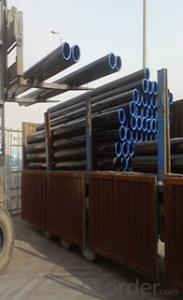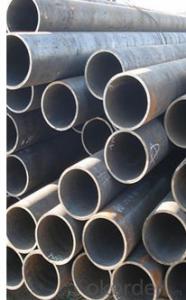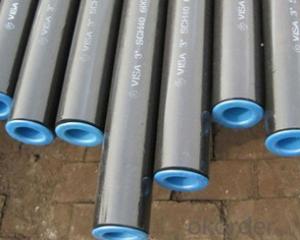High-quality Carbon Seamless Steel Pipe For Boiler 20#CNBM
- Loading Port:
- Qingdao
- Payment Terms:
- TT OR LC
- Min Order Qty:
- 10 pc
- Supply Capability:
- 30 pc/month
OKorder Service Pledge
OKorder Financial Service
You Might Also Like
Quick Details
| Thickness: | 3 - 60 mm | Section Shape: | Round | Outer Diameter: | 21.3 - 1220 mm |
| Secondary Or Not: | Non-secondary | Application: | fluid pipe,boiler pipe, structural pipe, oil/gas/water pipe etc | ||
| Technique: | Hot Rolled | Certification: | ISO9001-2000, ISO14000, ISO18000 , API 5L | Surface Treatment: | Painted, Oiled, galvanized or phosphate etc |
| Special Pipe: | API Pipe | Alloy Or Not: | Is Alloy | Technique:: | Hot rolled or cold rolled |
| Special pipe:: | API/ ASME/thickwall/oil/gas/water pipe | Length:: | 3-12m | Treatment of two ends:: | Beveled end , plain end etc |
| Brand:: | Bai Chuan | Third Party Inspection:: | BV, SGS etc. | Schedule:: | SCH10-SCH160, XS, XXS |
| Other Material:: | 10#, 20#, 16Mn, Q345 etc | Material Type:: | Carbon steel/ Low alloy steel | Producing standard:: | American/Japanese/ German/ Britain/ Chinese standard |
| Grade: | A53(A,B),A106(B,C),A210,API J55,St37,STPG42,A53-A369,API J55-API P110,ST35-ST52 | Standard: | BS EN10296,JIS G3452-2004 |
1. Out Diameter: | 21.3mm-1220mm |
2. Wall Thickness: | 3mm-60mm |
3. Length: | 3m-12m |
4. Producing Standard: |
|
5. Main Material: (Carbon Steel & Low Alloy steel) |
|
6. Special specifications: | Available according to customer’s requirements and quantity. |
7. End Shape: | Beveled end , plain end, varnished, or adding plastic caps to protect the two ends as per customer’s requirements. |
8. Surface treatment: | Painted, Oiled, galvanized, phosphate etc. |
9. Usage: |
|
10. Certificates: | ISO9001-2000, ISO14000, ISO18000, API 5L certificate |
11. Third party inspection: | Welcome you to send a third party inspecting company (BV, SGS etc) to check the quality of our final products. |
12. Pictures: | our producing flow chart, our factory, production line, inspecting equipments, our products are listed below for your reference. |
- Q:How are steel pipes used in the transportation of fluids?
- Steel pipes are commonly used in the transportation of fluids due to their high strength and durability. They are used in various industries, including oil and gas, water supply, and sewage systems. Steel pipes are ideal for fluid transportation as they can handle high pressure and are resistant to corrosion. They are used to transport liquids and gases over long distances, ensuring a safe and efficient flow of fluids.
- Q:How do you select the right size of steel pipe for a project?
- To select the right size of steel pipe for a project, it is important to consider factors such as the desired flow rate, pressure requirements, fluid type, and the overall structural design. Consulting relevant design codes and standards, performing calculations based on these parameters, and seeking expert advice can help ensure the appropriate size is chosen to meet the project's specific needs.
- Q:What are the different methods of heat treatment for steel pipes?
- There are several methods of heat treatment for steel pipes, including annealing, normalizing, quenching, tempering, and stress relieving.
- Q:Can steel pipes be used for underground transportation tunnels?
- Yes, steel pipes can be used for underground transportation tunnels. Steel pipes are commonly used in the construction of underground tunnels for various purposes such as transporting water, gas, and sewage. They are known for their durability, strength, and resistance to corrosion, making them suitable for underground applications. Steel pipes can withstand the weight and pressure exerted by the surrounding soil and can be reinforced to ensure stability. Additionally, steel pipes can be manufactured in various sizes and lengths, allowing for flexibility in tunnel design. However, it is essential to consider factors such as soil conditions, load-bearing capacity, and potential environmental impacts when deciding to use steel pipes for underground transportation tunnels.
- Q:What is a tight steel tube?
- JDG pipe is the replacement of traditional PVC and SC pipes and other traditional wire conduits. It is a breakthrough in the field of building electrical field using new materials and technologies. The JDG pipe adopts the cross connecting ground wire of galvanized steel pipe and thin-wall steel pipe, overcomes the defects of complicated construction and large construction loss of common metal pipe, and solves the problems of poor fire resistance and difficult grounding of PVC pipe. Because the JDG pipe material is more expensive than the ordinary pipe material, it is more used in the construction, such as comprehensive wiring, fire protection wiring and so on.
- Q:How are steel pipes used in the manufacturing of HVAC systems?
- Steel pipes are commonly used in the manufacturing of HVAC systems for various purposes. They are primarily used for transporting fluids such as water, refrigerants, and gases throughout the system. Steel pipes provide durability and strength, ensuring the safe and efficient transfer of these substances. Additionally, steel pipes are often used for structural support, acting as a framework for the HVAC system. Overall, steel pipes play a crucial role in the manufacturing of HVAC systems by facilitating fluid transportation and providing structural stability.
- Q:How are steel pipes used in the chemical industry?
- Steel pipes are extensively used in the chemical industry for various applications, including transportation of chemicals, gases, and liquids. They are highly durable, corrosion-resistant, and can withstand high pressure and temperature conditions. Steel pipes are used in chemical plants for the transfer of raw materials, intermediate products, and final products within the production process. They are also employed for the distribution of utilities such as water, steam, and compressed air. Additionally, steel pipes are utilized for the construction of storage tanks, reactors, and other equipment in the chemical industry due to their strength and reliability.
- Q:What are the different types of steel pipe connections for fire sprinkler systems?
- There are several types of steel pipe connections used in fire sprinkler systems including threaded connections, grooved connections, flanged connections, and welded connections.
- Q:What is the impact of temperature on steel pipes?
- The impact of temperature on steel pipes is significant and can have both positive and negative effects. At high temperatures, steel pipes can experience thermal expansion, causing them to expand and potentially leading to distortion or buckling. This expansion can also affect the joints and connections, potentially causing leaks or failures. Therefore, it is crucial to consider the coefficient of thermal expansion when designing and installing steel pipes in high-temperature environments. On the other hand, steel pipes typically have excellent thermal conductivity, allowing them to withstand high temperatures without significant degradation. This makes them suitable for applications where heat transfer is a primary concern, such as in industrial processes or heating systems. Extreme cold temperatures can have detrimental effects on steel pipes as well. In freezing conditions, water or other fluids inside the pipes can expand and lead to cracks or bursts. This can cause leaks, loss of fluid, and potential damage to surrounding structures. Therefore, appropriate insulation and preventive measures need to be taken to ensure the integrity of steel pipes in cold environments. Additionally, temperature variations can also affect the mechanical properties of steel, such as its tensile strength and toughness. For instance, exposure to elevated temperatures over an extended period can lead to a phenomenon known as thermal degradation, where the steel's strength decreases, making it more prone to deformation or failure. In conclusion, the impact of temperature on steel pipes is significant and can influence their structural integrity, thermal performance, and mechanical properties. Proper design, insulation, and maintenance are essential to ensure the safe and efficient operation of steel pipes in various temperature conditions.
- Q:How are steel pipes tested for leaks?
- Steel pipes are typically tested for leaks using various methods such as hydrostatic testing, pneumatic testing, or advanced technologies like ultrasonic testing. In hydrostatic testing, the pipe is filled with water or another liquid, and pressure is applied to check for any leaks. Pneumatic testing involves using compressed air or gas to pressurize the pipe and identify potential leaks. Ultrasonic testing employs high-frequency sound waves to detect any leaks or flaws in the steel pipes. These testing methods ensure the integrity and quality of steel pipes before they are put into use.
1. Manufacturer Overview |
|
|---|---|
| Location | |
| Year Established | |
| Annual Output Value | |
| Main Markets | |
| Company Certifications | |
2. Manufacturer Certificates |
|
|---|---|
| a) Certification Name | |
| Range | |
| Reference | |
| Validity Period | |
3. Manufacturer Capability |
|
|---|---|
| a)Trade Capacity | |
| Nearest Port | |
| Export Percentage | |
| No.of Employees in Trade Department | |
| Language Spoken: | |
| b)Factory Information | |
| Factory Size: | |
| No. of Production Lines | |
| Contract Manufacturing | |
| Product Price Range | |
Send your message to us
High-quality Carbon Seamless Steel Pipe For Boiler 20#CNBM
- Loading Port:
- Qingdao
- Payment Terms:
- TT OR LC
- Min Order Qty:
- 10 pc
- Supply Capability:
- 30 pc/month
OKorder Service Pledge
OKorder Financial Service
Similar products
New products
Hot products
Related keywords































